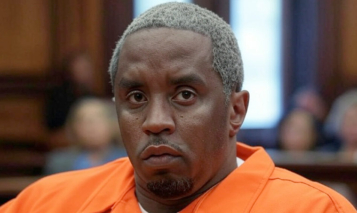Shaquille O’Neal‘s son Shareef O’Neal will sit out his freshman year at UCLA after the medical staff there discovered an undiagnosed cardiac problem that requires surgery.
“Thank God the UCLA medical staff caught it early,” Shareef, a standout high school basketball recruit, told TMZ Sports, according to NBC Sports.
He added: “Blessed to be here living today, one of those moments on the court could’ve been my last.”
The 18-year-old was a highly recruited basketball star who initially committed to play for Arizona before changing his mind and committing to UCLA men’s basketball.
Shareef plans to attend classes after recovering from heart surgery. He hopes to return to the basketball team for the 2019-20 season.
Shareef’s cardiac problem was discovered during a physical exam administered by UCLA medical staff. Shareef did not specify the cardiac disorder that requires surgery.
Cardiac symptoms that are assessed during routine exams include heart murmurs or arrhythmias (irregular heart rhythm) that can be caused by atrial fibrillation, coronary artery disease (narrowing of the arteries), damage to the heart muscle from lack of oxygen, blocked arteries, aortic stenosis (narrowing of the left ventricle), mitral valve prolapse, or congenital heart defects (birth defect) that were not previously diagnosed.
Some patients have no symptoms at all and their cardiac problems aren’t diagnosed until they suffer a heart attack or stroke.
If Shareef had an undetected cardiac birth defect, he would not have any symptoms. His cardiac defect may not have been discovered until he participated in an exercise stress test.
An exercise stress test detects underlying cardiac abnormalities that could cause athletes to collapse and die while playing sports.
A stress test measures an athlete’s heart rate, heart sounds, blood pressure and respirations during exercise. An elevated heartbeat or blood pressure that don’t return to normal when the patient is at rest is cause for concern and requires further diagnostic testing.
Undetected coronary abnormalities are the leading cause of sudden death in young athletes.
Photo by Emma McIntyre/Getty Images







Thank God it was caught and is manageable.
Praying he has a speedy recovery and can continue to live the life he wants.
Thank God they caught it.
I knew a grandmother who was driving her 15 year old granddaughter somewhere & she died in the car. No drama. No warning. Just stopped being alive. The grandmother thought her granddaughter was playing a joke & then she discovered she was dead.
Was just speaking on this. Too many players have heart issues and its linked to race and a few other factors.
I read last year that over 20% of NBA players have some sort of heart issue. Thats a high ass number.
Best of luck to him. Godspeed.
Do you think it is from their height and strain of athleticism?
We should have our children tested early by a cardiologist. School physicals don’t detect these types of conditions.
I remember watching him on one of his mother’s shows. He’s such a sweet young man! Wishing him and his family well.
Yes. It cited that players over 7 feet have quite a few issues etc. Which Shaq is over 7 feet. So may be congential for the fella above. Nobody knows. Another article same week, said how so many die of heart disease after retiring. Mo Malone and D.Dawkins both I think passed due to it. It just cited a lot of things and made me kinda sad.
https://www.si.com/nba/2015/09/14/moses-malone-death-heart-doctor
http://digitalchew.com/2017/12/07/nearly-20-of-nba-players-have-heart-issues-study-finds/
Wishing him well. Thank goodness it was detected.
Speedy recovery to him……
Aw hope it goes well
Good luck to him.
Almighty bless his heart……literally.
Wow my prayers go out to him, he seems like a really good young man on and off the court. his head is in the right place with continuing his education. His true talent is just the icing on the cake! To think that LaVar Ball robbed his son of this opportunity is just mind boggling.
Hope all goes well, and his surgery and recovery time are successful!
Praying for him ?
Hope all goes well!
Sending out prayers. Is this Shaunie’s son or another baby mama’s. Why isn’t this stress test given to all high school athletes?
Prayers to the whole family.
Wow, so happy to hear this was found out before something tragic happened. All the best to him and his family.
I hope the proceedure is successful… I’d be afraid for him to go back to playing ball afterwards if I was his parents.
Ohhhh that’s sooo sad
One of my kids have something similar but no surgery (thank god) just monitor them yearly…EKG, stress test, MRI, etc…I’m glad it was caught early
Bless You Young man.
I think all of Shaq’s kids by Shaunie’s.
All of his kids are from Shaunie.
I think it’s expensive. Parents barely want to get $25 Physicals (which are VERY inefficient). Parents can always get them without prompting from the government.
In Atlanta a couple of athletes have died from an enlarged heart over the years and usually after that someone will have one day where they give that test (It’s expensive also) for free to whoever comes.
The scariest thing is that the athlete could have been fine for YEARS and then bam, they are gone.
As I type, I think I need to take my child to the Cardiologist since I have exhausted my 6,000 deductible.
Everything will go great speaking nothing but positive results for this young man
Prayers to him. He will come out stronger!
I’m glad they caught it. Hopefully they don’t medically retire him because of this. He’d be a liability if he dropped dead on the court.
Shaq has good karma.
Best of luck to him.
Prayers up to him! I was looking forward to him playing. I hope is surgery and recovery goes well.
Shaq brought in a daughter, Shaunie brought in a son. Together they have 4. Shareef is the oldest of the 4.
Goodluck young man ?
I wish him the best.
Ok thanks, didn’t know that. Got me researching now lol
No his daughter Taheerah is not Shaunie’s, and her son Myles isn’t Shaq’s.
??????
Hope all goes well for your son. Blessings.
Praying for you young man ???
He can always get degrees, like his parents, to become the boss of his own company like his father via investing his inheritance well. -he’ll be a winner in life one way or another.
Wow, do you see how God works? He was supposed to o go to Arizona but changed his mind and went to UCLA where they discovered his heart condition. Praying for a speedy recovery!
I have respect for Shaq he’s a good father. Do any of yall remember that song he put out way back in the day “Biological didn’t bother?” about his deadbeat father and how his step father raised him to be a man.
https://youtu.be/y2J5xEOIoCA
Glad they found it before he had an incident on the court or during practice!
Get well soon young man??
I couldn’t just sit around and do nothing like my doctors suggested.They didn’t want me to do anything or to take herbs or herbal remedies, but I had to try something – they just wanted me to do dialysis!This program allowed me to take control of my health. I went from Stage 4 to Stage 3 kidney disease are you having a high viral load count
Or problem with your CD4 TREATMENT or better still PreP treatment
Also liver inflammatory also seems not to be a problem to our registered users on our sites as we teach individuals on how to manage there self and household a quick contact on WhatsApp or call can change your life forever or whatsapp +233245402167
Shaq should NEVER EVER make that face again? . Prayers for his son??
men that look like Shaq should only have babies by very very overly attractive females. it should be some kind of law really. those kids are challenged look wise because of the un attractiveness of both parents
Best wishes to him…but I don’t think he should take the chance coming back. He doesn’t need the scholarship or notoriety. In fact, this may be the perfect excuse to get out of his dad’s shadow because everyone will be comparing the two…better to step away before he has to prove anything.
I wonder if there is a correlation between heart disease and height.